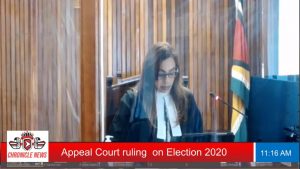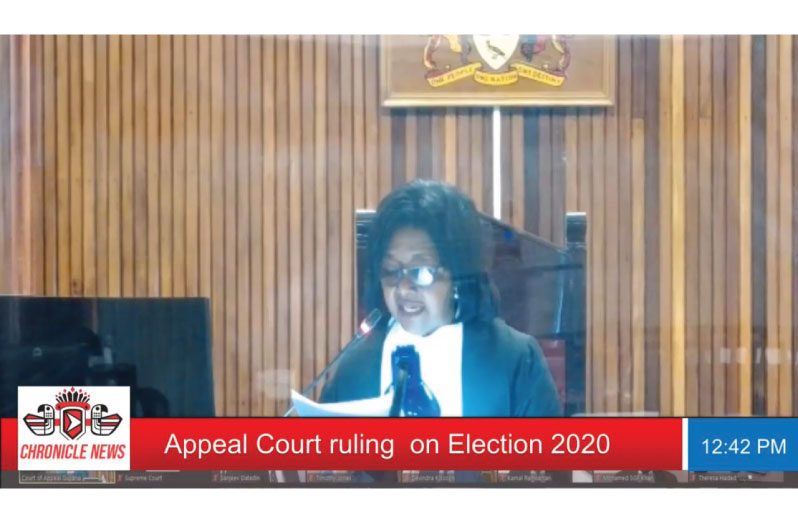…grants 24-hour stay
By Svetlana Marshall
IN a unanimous decision on Thursday, the Court of Appeal, in upholding the judgment of the High Court, ruled that there can be no challenge to the legality of the National Recount or the decision of the Guyana Elections Commission (GECOM) to set aside the 10 Declarations made in March, outside of an Elections Petition; and as such, it dismissed the appeal filed by Misenga Jones.

The ruling was handed down by a panel of three judges led by Justice of Appeal Dawn Gregory. The other judges were Justice of Appeal, Rishi Persaud and High Court Judge, Priya Beharry. Jones, in her appeal, had challenged Chief Justice (ag), Roxane George-Wiltshire’s decision to uphold the national recount, arguing that Section 22 of the Election Laws (Amendment) Act and by extension the Recount Order (Order 60) were unconstitutional, and on that basis the Elections Commission was constitutionally bound to declare the results of the General and Regional Elections based on the 10 Declarations made by the Returning Officers (ROs) in March.
The Chief Justice had ruled that the majority of issues in the FDA filed by Jones were res judicata, and any challenge to the constitutionality of Section 22 and by extension the Recount Order ought to come by way of an Elections Petition. Dissatisfied with the decision, Jones moved to the Appellate Court.
The Tucville, Georgetown voter had resorted to the High Court following a decision by Chairman of the Elections Commission, Justice (Ret’d) Claudette Singh to invalidate the 10 Declarations made by the Returning Officers , so as to pave way for the Certificates of Recount to be used in the Chief Elections Officer, Keith Lowenfield’s Elections Report.
The Court of Appeal, however, dismissed the application filed by Jones, and in doing so, ruled that the results of the General and Regional Elections must be declared using valid votes tabulated during the national recount.
“Order 60 was created from the powers exercised under Section 22 of the Elections Law (Amendment) Act. The Order can only be deemed unconstitutional at an Elections Court, in the same way as the constitutionality of Section 22 itself,” Justice Gregory ruled.
That position, Justice Gregory said, was fortified by the Caribbean Court of Justice (CCJ) in the case – Bharrat Jagdeo and Irfaan Ali v Eslyn David and Others – when it ruled that Order 60 forms part of the electoral laws of Guyana, and must be adhered to.
Through a battery of Lawyers led by Senior Counsel John Jeremie, Jones had argued that the procedure employed during the national recount was not in conformity with the Representation of the People Act but Justice Gregory ruled that challenges to the legality of the procedures employed during the recount and or to the decision of GECOM to set aside the 10 Declarations made in March, must come by way of an Elections Petition in accordance with Article 163 of the Constitution.
JURISDICTION
From the onset, Justice Beharry indicated that the High Court had no jurisdiction to determine the constitutionality of Section 22 of the Election Law (Amendment) Act, the legality of the Recount Order (Order 60), or the lawfulness of the actions of the Elections Commission as sought in the Fixed Date Application (FDA) filed by Jones. In doing so, she referenced to the provisions of Section 140 (1) of the Representation of the People Act and Article 163 of the Constitution.
“In summary, these provisions seem to be saying that the court’s ordinary supervisory jurisdiction is ousted from inquiry into whether GECOM and or its members have validly performed its functions or not, except under the exclusive jurisdiction conferred by Article 163 of the Constitution. It does not completely ousts the court’s jurisdiction but provides jurisdiction by special procedure in the form of an Elections Petition after the elections have been declared,” the High Court Judge explained.
Justice Beharry was keen on noting that the case of Reeaz Holladar v the Region Four Returning Officer and others in the High Court was rightly subject to judicial review because it did not touch on the validity of the elections rather the Returning Officer’s compliance with the Representation of the People Act. Further, she noted that Returning Officers do not enjoy the protection of Section 140 of the Representation of the People Act. The case brought by Jones, she posited, was vastly different.
“In this regard, I find that the Chief Justice had no jurisdiction to interpret the constitutionality of Section 22 of the Election Laws (Amendment) Act, Order 60 or Article 177 of the Constitution to determine whether GECOM was acting lawfully, as this runs contrary to the jurisprudence as demonstrated by the CCJ’s ruling in Ali and Jagdeo, that those issues properly belong in an elections petition after the declaration of the final results,” Justice Beharry ruled.
CEO MUST ABIDE WITH THE ORDERS OF GECOM
However, with respect to the impasse between the Chairman of the Elections Commission, and the Chief Elections Officer, Justice Beharry said that the jurisdiction of the Chief Justice was not ousted by Section 140 of the Representation of the People Act since the primary issue is linked to the CEO’s compliance with his statutory functions and not the validity of the elections.

In laying the foundation of her ruling, the High Court Judge said the Chief Elections Officer is subject to the direction, control and supervision of GECOM as provided for in Section 18 of the Election Laws (Amendment) Act. Additionally, she pointed out that Section 22 of the Election Law (Amendment) Act empowers the Elections Commission to remove any difficult that arises during the application of the Representation of the People Act by amending the Electoral Laws.
The Chief Elections Officer, she said, is therefore obligated to act in accordance with the entire electoral regime – the Constitution, the Representation of the People Act, the Election Laws (Amendment) Act and Order 60 as directed by the commission.
“Therefore, the directions given by GECOM and or its Chairperson to CEO to prepare his report in accordance with the recount must be treated as a valid lawful directive, which the CEO is required to obey by virtue of Section 18 of the ELAA [Election Laws (Amendment) Act,” Justice Beharry ruled.
It was explained that while Section 96 (1) of the Representation of the People Act mandates the Chief Elections Officer to ascertain the results of the elections based on valid votes tabulated in accordance with Section 84; the tabulation process was overtaken by the Recount Order, which now forms part of the electoral regime. As such, she said the CEO, while complying with Section 96 must now base his Elections Report on the Recount Order.
“It is disingenuous for the CEO to insist on preparing a Section 96 Report on the basis of the March 13 Declarations when GECOM specifically issued Order 60 to cater for the various disputes and contentions that arose after polling day as stated in Recital Eight of Order 60,” the High Court Judge said.
The Chief Elections Officer, she iterated, must comply with the directive of the Elections Commission and submit an Elections Report in accordance with data generated during the national recount.
For his part, Justice of Appeal, Rishi Persaud, in agreeing that the High Court had limited jurisdiction to address the electoral impasse, endorsed the position that the Chief Elections Officer is mandated the comply with the instructions of the Elections Commission and or its Chairman.
“However, this limited jurisdiction cannot be invoked to resolve any question as to the validity of an election itself; it is in this limited context her Honour [Justice Roxane
George-Wiltshire] was plainly correct in concluding that the CEO must act upon GECOM’s direction to produce his report in accordance with the recount. This effectively resolved the impasse by smoothing the electoral process,” Justice Persaud posited.
Referencing to the decision of the CCJ in the case – Bharrat Jagdeo and Irfaan Ali v Eslyn David and others – the Appellate Judge said it was the ruling of the apex court that the valid votes counted during the recount exercise are incapable of being declared invalid by any person or authority. He emphasised that the CCJ’s decision must be read as a whole in order to fully appreciate its impact on the issues highlighted.
Justice Persaud also agreed with the Chief Justice when she ruled that the 10 Declarations made by Returning Officers have been overtaken by events, and as such, iterated the position of the court, that the results of the elections must be declared in accordance with the valid votes tabulated during the national recount. Collectively, the judges in the Appellate Court, ruled that the majority of the issues raised in Jones’ appeal were res judicata having been ventilated in previous cases, and therefore amounted to an abuse of the court.
“I am satisfied that there is duplication in the claims brought by Misenga Jones with those brought by Ulita Moore,” Justice Gregory had said as she cited the issue surrounding the constitutionality of Section 22 of the Election Laws (Amendment) Act and the National Recount as examples.
COURT’S DECISION STAYED
Senior Counsel Roysdale Forde, who appeared in association with Attorneys-at-Law John Jeremie, S.C and Mayo Robertson, made an application for the decision of the court to be stayed for a period of three days. This application was met with objection by the majority of the respondents including Kim Kyte-Thomas, the attorney representing the Chairman of Elections Commission. Kyte-Thomas said with the case having been dismissed, it is time to bring the electoral process to a close.
Initially, Justice Persaud and Justice Beharry had objected to the application, however, following based on an oral submission by Attorney-at-Law Maxwell Edwards, who appeared in association with the Attorney General Basil Williams, Justice Gregory and Justice Persaud agreed to stay the decision of the court for a period of 24 hours.




.png)









